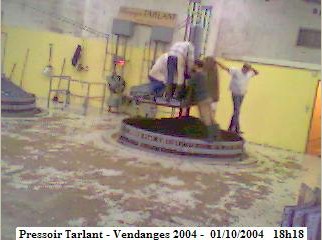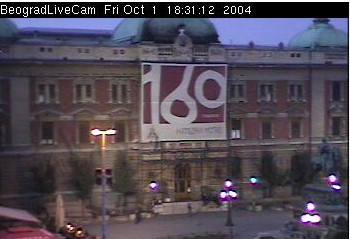ï


Windows on the World: Always-on live webcams from the Tarlant winery in Champagne, France (top) and the town square in Belgrade, Serbia.
Here are seven more intriguing ideas from The Global Ideas Book. As with all of the ideas in the book, these are just concepts, not fully-formed plans or proposals. While none of them would be easy, and there are obvious problems to be overcome with each, I think with appropriate collaboration, a sound framework and commitment of resources, they are all feasible, and could make a dramatic difference in our lives:
- Windows on the World: Several of the ideas in the book revolve around allowing people anywhere in the world to see, live and unedited, what is happening on the opposite side of the globe. The basic idea is to establish live ‘portals’ from various places around the world that would be broadcast into major meeting-places elsewhere in the world on large, life-size screens, and also via the Internet. A related idea is a process by which tourists could be trained by professional filmmakers how to produce quality mini-documentaries about places they were about to visit, in return for which they would make the mini-documentary free for all online on their return. Another suggestion was allowing and enabling the placement of webcams in the world’s hotspots and places where human rights violations are occurring to permit the world to witness what is happening. Another idea was to put webcams in all public corporation shareholder meetings. Yet another idea proposes a satellite or cable channel that would continuously show live programs relayed from various countries around the world simultaneously translated into the viewers’ native language, so that viewers could get an unfiltered sense and understanding of the local culture in these countries. All of these ideas have a common purpose: to use the Internet and wireless connectivity to break down the cultural and information barriers between people and nations.
- Directing Your Taxes: Two of the ideas in the book propose that taxpayers be allowed some choice in how their tax dollars would be spent, permitting some citizen participation in the decisions on how much of our tax dollars should be allocated to programs such as defense, education, health and humanitarian aid.
- Maximum Wage: One proposal is that no one should be able to earn more than, say, twenty times the minimum wage, by imposing a 100% tax on income beyond that amount, as a means to redistribute exorbitant wealth to those in need without discouraging entrepreneurship.
- Community-Based Consumer/Citizen Networks: One of the ideas is to create a capability for any self-defined community in the world to establish an online forum for sharing information about local products and services, so that consumers can learn from their neighbours and shop more wisely, and for sharing information about local issues and events to enable greater community participation and activism.
- Designated Candlelight Evenings: One of the ideas is to designate, say, one evening per week as a candlelight evening, when lights (and perhaps all electronic appliances) would be turned off and the time spent in conversation, quiet social activities, public discourse, reading or reflection — saving a lot of energy in the process.
- Virtual Fences: One of the ideas is to replace costly, ugly, and community-dividing fences with invisible, virtual fences that would establish boundaries for legal purposes, and keep animals from wandering (through use of a warning noise or mild shock when the boundary was neared), without disrupting neighbourhoods and the sense of openness and view of nature the way physical fences do.
- Democratic Seating Lotteries: Instead of the best seats on airplanes (like the ones pictured above), in theatres, concert halls and sporting arenas always going to the rich and connected, one idea suggests that all seats be priced the same, and a lottery draw be used to determine who gets the best seats.
There are also several ideas in the book along the lines of the ‘save the world’ think-tank I have been talking about, where the power of the Internet, collaboration tools, innovation processes and the Wisdom of Crowds would be tapped to engage the world’s best minds to solve the world’s most intractible problems, instead of leaving it all up to politicians, scientists and corporations. But none of these proposed ideas, in my opinion, is sufficiently open, well-articulated or powerful to get me to sign up. We need a ‘save the world’ think-tank, but I believe we need to put more work and involve more creative minds in its design before we try to roll it out, if we hope to effectively attract and deploy the talent needed to solve these problems.
|







The directed taxes idea is interesting, but it seems like it would present a big coordination problem. You could get some programs getting way too much money, and others not enough, simply because everyone directs the money to their favorite program without knowing whether others will do likewise.The point of taxes is that everyone has to pay, and then we decide as a polity how to spend them. “Directed taxes” seem too much like private charity. We should democratize, not privatize, spending decisions.
As John Saul points out over and over in Unconscious Civilization, direct representation (or in this case directed taxes) is easily manipulated by rhetoric and charismatic figures. This has been born out in states which allow direct voting on propositions–often its who spends the most money, not which is the better cause, that determines the results. Colorado is currently waging a huge war between its citizens and the two local power companies to pass a bill requiring 10% of its electricity be from renewable sources. Over 90% of the population was in for it before the misinformation and campaigning against it started–now its a race too close to call.Lets not forget our history and take a step backwards.
As far as windows go, how about windows on Politics. Lets not let our politicians have any closed door meetings (anywhere), excepting for the time being national security. And lets not limit it just to politicians, but the staffs, political party officers and lobbyists as well.
On “Community-Based Consumer/Citizen Networks”: these are starting to happen in many places, in the usual halting and haphazard way of social movemements. The technological trigger is the emergence of reasonable cost wireless networking. I’m involved in trying to help some of these emerge in the Los Angeles area.On the “‘save the world’ think-tank”: if and when such a thing starts to happen, I propose a rule for participation: every member spends part of the time “in the tank” and part of the time working locally in some community or organization facing daily practical issues as it tries to create its future. As a WAG, I suggest 1/3 time in the tank, 2/3 outside. Something like this will both keep the thinkers well-grounded, and spread the benefits of their thinking into the places where they’re needed.
Stentor: I can see problems with a lot of these ideas, and it’s easy to say that if they were such great ideas someone would have already implemented them. But I’d prefer to keep an open mind about them and acknowledge that a great deal of thought, creativity, and perhaps some compromise would be needed to successfully implement them. What you could do with directed taxes, for example, might be to establish a minimum and maximum budget, and use the Directed Taxes results to determine where in that range each department or program might be funded. If recent surveys are an indicator, that would mean a lot more would be spent on humanitarian aid and a lot less on defense than is the case today.Derek: I too am a skeptic about referendums (and a big fan of Saul), but I’m also persuaded by The Wisdom of Crowds that relying on experts to tell us what we should be doing with tax dollars isn’t the best answer either. As for Windows on Politics, I love the idea, as long as it’s not limited to public events — no one should be subjected to the grinding boredom of Question Period or Congressional Hearings. But seriously, the challenge would be stopping politicans from classifying anything interesting or revealing as ‘national security’.Don: I’m involved in a couple of community-based networks too, and the challenge is that there are whole segments of the community that aren’t online, some of whom need the networks the most. And I agree completely that we need to keep pure theorists out of the think tank, and keep everyone involved anchored in the real world. Does that mean lawyers and politicians are banned? ;-)
I agree that these are difficult to implement, but that’s not a reason not to consider them. Further thought and consideration can be given: the initial ideas can be built upon and improved and developed. In the Global Ideas Bank, we now have a system where we can invite people who submit bright ideas such as these to flesh them out more, thinking about the realities of how they might be put into practice…put down a project plan etc- As Dave says, the directed taxation could be limited to a certain proportion of the overall budget (as little as 1%) so that other areas don’t lose out but people have more of a say in where some of their money goes (this might be easier in the UK, where there is no similar state system)- The Maximum Wage seems unlikely, but check out the Mondragon co-operative for how it can work in practice….- The community-consumer organisations are starting to start up, and they will inevitably be grassroots to begin with, but more thought could be given to how they might link up coherentlyLest we forget, these ideas are from ordinary people on the ground, putting their thoughts forward on how to solve problems. Do they need refining, improving, building upon? Yes: so comment on them, add suggestions online….and so on. Then we can start to get towards the kind of democratic think-tank we are talking about: where ideas are from the people, by the people, for the people.